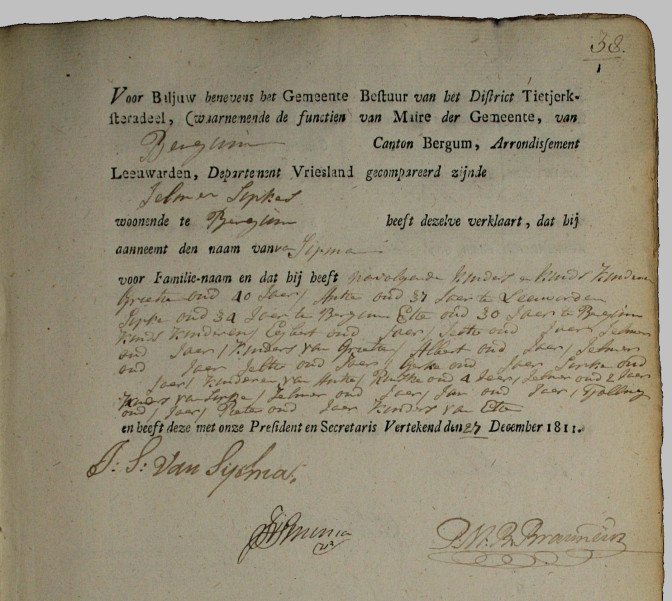
Napoleon. Image credit: Wikimedia Commons
The French occupation from 1795-1813 introduced many new types of administration, including the civil registration. To properly record people, it was necessary that they all had a last name. In 1811 and 1813, Napoleon decreed that everybody had to register their last name.
After the French occupation ended, the Dutch government decided to keep the obligated last name. In 1825 they required that everybody who had not registered his name yet should do so.
You can find information about people that took a name in 1811/12, 1813 and 1825/26 in the registers van naamsaanneming (name taking records).
Information in a name taking record
A name taking record usually includes the name of the head of the household, place of residence, the names of the children (sometimes including the grandchildren) and their ages. Widows often registered a name for their children which was different from her own name.
Example: Jelmer Sipkes Sipma

Name taking record of Jelmer Sipkes Sipma.1 Image credit: Tresoar
Bergum, Tietjerksteradeel [Friesland]
Appeared Jelmer Sipkes, living in Bergum, who declared to take the name of Sipma as family name and that he has the following children and grandchildren:
Grietie age 40, Antie age 37 in Leeuwarden, Sipke age 34 in Bergum, Etie age 30 in Bergum, grandchildren Eybert age [blank], Jelte age [blank], Jelmer age [blank], children of Auke; Rinske age 4, Jelmer age 2, children of Sipke; Jelmer age [blank], Jan age [blank], Tjalling age 1, Pieter age [blank], children of Etie.
27 December 1811
[signed]
J: S: van Sipsma
This record gives us three generations of the Sipma family from Bergum. It also suggests the origin of the name Sipma, which probably comes from the patronymic (name derived from the father’s name) Sipkes. It is interesting to note that the signature uses the name “Van Sipsma” instead of the name Sipma that was just recorded. It took a while for people to get used to their new names and spelling variations were not uncommon in the first years of the civil registration.
Availability of name taking records
Most people in the Netherlands already had a surname in 1811 and did not have to register their names. There are basically two groups of people for whom you can find name taking records: people from the northern provinces and Jews.
In the northern provinces of Groningen, Friesland, Drenthe and Overijssel, many inhabitants still used patronymics and did not have a surname. In this region, name taking records are a rich source of information and are often the earliest known occurrence of the name.
In the other provinces, name taking records do not include a large part of the population since most people already had a last name. One group of people that did not always use a last name before 1811 were Jews. In provinces like Zeeland and Noord-Brabant, most families you will find in name taking records are Jewish. In the northern provinces, where many people took last names, Jews were often recorded in separate ledgers.
Not all the name taking records that were created, still exist. Name taking records for some municipalities in provinces like Friesland, Drenthe and Zeeland have been lost. You can search the online catalogs of the provincial and local archives for the term naamsaanneming to see which records survive.
Name taking records online
Two provinces provide online access to name taking records:
- Alle Friezen, index and digital images for Friesland.
- Collectie Overijssel, index and images for Overijssel. Click the “Zoeken” [Search] box open and select “insch.reg.naamsaanneming” as “bron” [source].
Some images of name taking records of various municipalities are available via the Familysearch Catalog. Search for the place name. If the name taking records have been scanned, they will be in the “Names, personal” category.
Some local archives also provide online access to these records. You can find them via the Digital Resources website by searching for naamsaanneming on the “internet” page for the province you’re looking for.
Dutch Genealogy source score
 Amount of information about births, marriages, deaths
Amount of information about births, marriages, deaths
 Amount of background information about your ancestors
Amount of background information about your ancestors
 Online availability of scans
Online availability of scans
 Online availability of indexes or transcriptions
Online availability of indexes or transcriptions
 Easy to understand if you don’t know Dutch
Easy to understand if you don’t know Dutch
Sources
- Name taking record of Jelmer Sipkes Sipma. Bergum, Friesland, name taking records 1811, call number 29_27 p. 38, Jelmer Sipkes Sipma; “Familienamen 1811” [Family names 1811], index and digital images, Tresoar (http://www2.tresoar.nl/genealogie/naamsaanname/: accessed 13 November 2013)
- Adri P. van Vliet, editor, “Registers van naamsaanneming,” Brabanders gezocht (‘s-Hertogenbosch: Rijksarchief in Noord-Brabant, 1995), p. 31
- Redmer Alma and Paul Brood, editors, “Registers van naamsaanneming,” Drenten gezocht (Assen: Rijksarchief in Drente, 1998), p. 34
- Pieter Nieuwland, “Registers van naamsaanneming,” Friezen gezocht (Leeuwarden: Tresoar, 2005), p. 54
- Pieter van Wissing, editor, “Registers van naamsaanneming,” Geldersen gezocht (Arnhem: Rijksarchief in Gelderland, 1996), p. 33
- Jan ten Hove, editor, “Registers van naamsaanneming,” Overijsselaars gezocht (Zwolle: Rijksarchief in Overijssel, 1999), p. 44-45
- Leo Hollestolle and Albert Meijer, editors, “Registers van naamsaanneming,” Zeeuwen gezocht (Middelburg: Zeeuws Archief, 2003), p. 38



I would like to find out my family history on my mother’s side she was Jewish and adopted by a Dutch family I do not know her birth last name just her adopted name is there any way to find information on that
That would depend on the date. What year was she born and adopted?